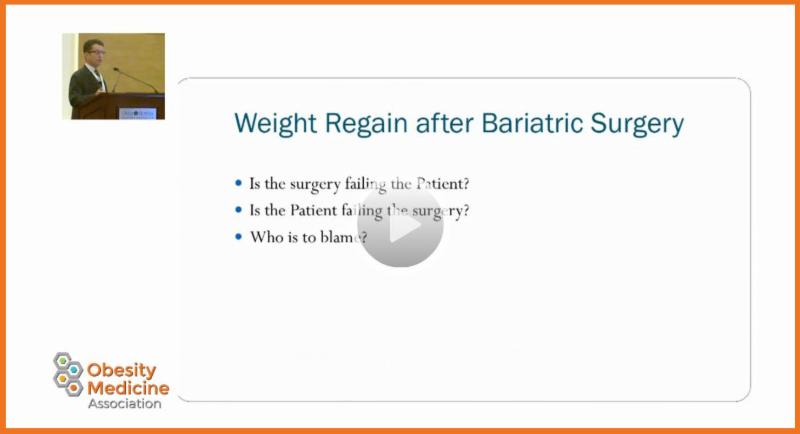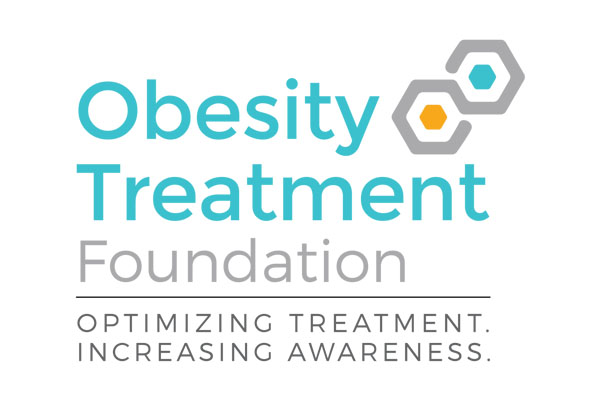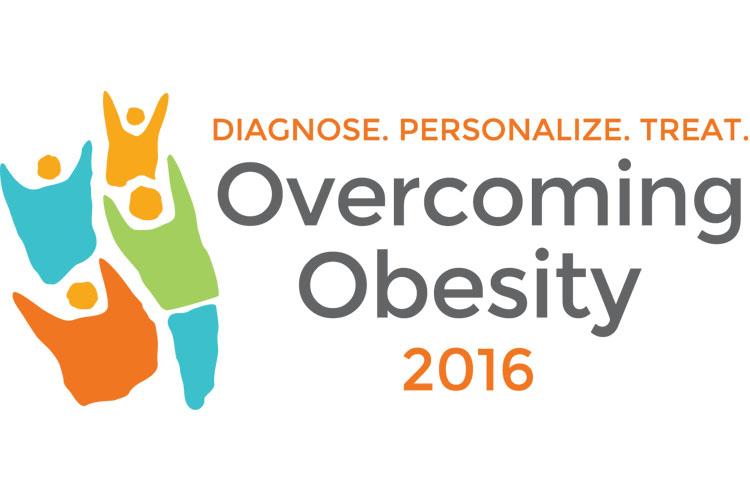
Recidivism after Bariatric Surgery
Visit the Obesity Medicine Academy to purchase and watch this presentation by Dr. Denis Halmi about weight regain after bariatric surgery and providing patients with practical strategies to overcome it. After you watch the presentation online, pass the quiz to claim 1 hour of CME/CE credit. |
 |
 |
|  |
From left: Drs. Jenny Seger, Craig Primack, Deborah Bade Horn, and Wendy Scinta
|
OMA Goes Global
Special report by Dr. Deborah Bade Horn, OMA presidentLast week, OMA leadership traveled to the International Congress on Obesity (ICO) in Vancouver, Canada. As a member of the World Obesity Federation (WOF), OMA provided education through a clinical symposium that shared the best of what we do as clinical leaders here in the U.S. Drs. Craig Primack, Wendy Scinta, Jenny Seger, and I shared clinical insights into treatment with our international colleagues. We provided faculty for WOF's SCOPE School, a smaller clinical-specific learning opportunity for attendees at ICO. We also participated as an exhibitor to get the word out about OMA! We were able to help those who need a home for clinical education find us and expand our international membership. Did you know that you and every OMA member has an automatic membership in the World Obesity Federation? You can participate in global e-learning and get reduced registration to WOF events. Visit worldobesity.org or contact membership@obesitymedicine.org to find out more about your WOF membership benefits. Obesity knows no boundaries and the opportunity to brainstorm and learn from each other around the world is invaluable. As the clinical leaders in obesity medicine in the U.S., we are able to provide our clinical perspective to our colleagues around the world.
|
 |
 Apply to Join the Board of Trustees
Take your leadership to the next level and become more involved! We're now accepting applications for the 2016-2017 Board of Trustees. Interested candidates must complete an application and submit it to OMA via email, fax, or mail by May 16. The following positions are available:
- Vice president (one-year term)
- Secretary/treasurer (one-year term)
- Trustee (three positions available, each a two-year term)
|
 Advanced Practitioner Testimonials: Why I Practice Obesity Medicine
The advanced practitioner committee has a new page on the OMA website! Advanced practitioner committee members responded to questions about practicing obesity medicine to show the diversity of health care professionals who work in the field. Starting this week, we'll highlight a portion of the conversation. You can view every members' answers on the website!
Conversation with Karli Burridge, PA-C
Q: How long have you practiced obesity medicine?
A: I have been practicing obesity medicine for a little over three years. I worked in bariatric surgery for three years and also established a medical (non-surgical) weight-loss program. Currently I am practicing non-surgical obesity medicine.
Q: How do you work with or interact with patients in your practice?
A: I conduct a thorough medical work-up, including labs and EKG, prior to starting a patient on a program. I also obtain a thorough weight history and work with the patient to put together a plan that suits their individual needs. This is all very similar to what my supervising physician would do. I tend to spend more time on health behaviors, such as stress management, sleep, etc., than my supervising physician does. If I have questions or concerns about a patient, I can always turn to my supervising physician for guidance. |
 |
|
|
|
Executive Director
Sponsorships and Exhibits Manager
Operations Manager
Education Coordinator
Communication Manager
Executive Director of the Obesity Treatment Foundation
|
|
101 University Blvd.,
Suite 330
Denver, CO 80206
|
|
|
Obesity Treatment Foundation
|
 Only Three Days Left to Submit Your Letter of Intent for a $15,000 Research Grant Only Three Days Left to Submit Your Letter of Intent for a $15,000 Research Grant
The Obesity Treatment Foundation (OTF) will offer one research grant this year in the amount of $15,000. This grant will assist an obesity medicine specialist in engaging in clinical research focused on determining effective obesity treatment approaches. OTF is now accepting letters of intent from clinicians interested in applying for this grant. Letters of intent are due by Friday, May 13, and selected applicants will be invited by June 6 to submit full proposals. Carefully review the submission instructions before submitting your letter of intent. Questions? Contact OTF at stacy@obesitytreatmentfoundation.org.
|
 |
 Weight Loss: A Patient and Physician's Perspective Weight Loss: A Patient and Physician's Perspective
This month, the Foundation began publishing a series of articles about weight loss from the different perspectives of patients and obesity medicine specialists. The articles will appear quarterly in Advances in Therapy, a free-access, peer-reviewed journal covering clinical, observational, real-world and health outcomes research. Read this article, co-authored by OMA chairman Dr. Eric C. Westman and Lynne Daniel Ivey.
|
 |
Believing in Food Addiction: Helpful or Counterproductive for Eating Behavior?
Ruddock, H. K., et al. Obesity, 2016.
Many people consider food addiction to be a contributing factor to obesity. A study was conducted to examine the impact of personal food addiction beliefs on eating behavior. Participants were given feedback on a food-related computerized task that they were told indicated if they had high, low, or average food addiction (although it did not). Food intake was then assessed via an ad lib taste test. Participants who thought they had high food addiction consumed fewer calories in the taste test than those who thought they had low food addiction. Increased dietary concern seemed to explain the lower food intake for those who thought they were addicted to food. The authors suggest that patients who believe that they are food addicts may restrict their dietary intake, at least in the short term. View article
|
Association between Artificially Sweetened Beverage Consumption during Pregnancy and Infant Body Mass Index
Azad, M. B., et al. JAMA Pediatrics, 2016.
Exposure to artificial sweeteners in utero may predispose offspring to develop obesity. A study was conducted to evaluate whether consumption of artificially sweetened beverages during pregnancy was associated with infant BMI. The study included 3,033 mother-infant pairs from a birth cohort that recruited healthy pregnant women from 2009 to 2012. The study found that women who drank artificially sweetened beverages such as diet soda every day while pregnant were more likely to have infants with a higher BMI a year later. There was no effect of maternal BMI, diet quality, total calorie intake, or other obesity risk factors on infant BMI. These findings suggest that dietary recommendations for pregnant women may need to be altered, given the epidemic of childhood obesity and widespread use of artificial sweeteners. View article
|
Effect of Didactic Lectures on Obesity Documentation and Counseling among Internal Medicine Residents
Ren, V., et al. Journal of Community Hospital Internal Medicine Perspectives, 2016.
Many health care providers feel ill-equipped to address obesity during patient encounters. To address this, internal medicine residents were provided feedback on the extent of their documentation and counseling and the need for improvement, and they were given two didactic presentations highlighting the need for obesity documentation and the importance of weight-loss counseling. Electronic medical records were then reviewed. Of the 139 patients with a BMI greater than 30kg/m2, who were seen both before and after the intervention, only three additional instances of obesity documentation were observed (n=70), and obesity counseling decreased by 3 (n=23) with no significant change pre- to post-intervention. Additional comorbidities increased the odds of the resident documenting obesity. Postgraduate year three (PGY3) residents were 56% less likely to counsel patients with obesity compared to PGY1 residents. These data suggest that obesity continues to be inadequately addressed in primary care, and education that increases knowledge and awareness may not have a significant effect on modification of behavior. The authors suggest that resident education should focus not only on knowledge but also the translation of knowledge into expected behavior. View article
|
 |

Overcoming Obesity 2016: Chicago, Sept. 21-25
If we missed you in San Francisco, we hope to see you in Chicago this fall! Overcoming Obesity 2016 is your primary source for clinical obesity education. This fall we're offering the Review Course for the ABOM Exam -- the course preferred by physicians to help them prepare for the obesity medicine certification exam -- and the Fall Obesity Summit, which contains an all-new lineup of topics and speakers. Overcoming Obesity 2016 takes place in Chicago on Sept. 21-25. Register online now! |
Review Course for the ABOM Exam
13 CME/CE | Sept. 21-22
Helps prepare those planning to take the American Board of Obesity Medicine (ABOM) certification exam.
| Fall Obesity Summit
17 CME/CE | Sept. 23-25
Addresses topics related to the clinical treatment of obesity and obesity-related conditions.
|
|

Obesity Medicine Basics
Obesity Medicine Basics returns this summer to four cities around the country. This introductory-level course is an opportunity for us to spread the word about obesity medicine to providers in a primary care setting. As a member of OMA, you can earn rewards by referring others to attend Obesity Medicine Basics. Your efforts referring your colleagues to this course will help grow the field of obesity medicine and increase the number of health care professionals with a basic understanding of how to treat obesity. Upcoming Courses: |
|
|
|
The Obesity Medicine Association and the Obesity Treatment Foundation thank our 2016 Corporate Advisory Council members for their continuous support.
|
© 2016 Obesity Medicine Association. All rights reserved. Materials may not be reproduced, redistributed or translated without written permission. Advertising disclaimer: Under a policy approved by the OMA executive committee and exhibitor/advertiser review committee, commercial companies may apply to advertise in OMA publications. Approval does not imply endorsement or official recognition of particular products or services.
|
|
|
|